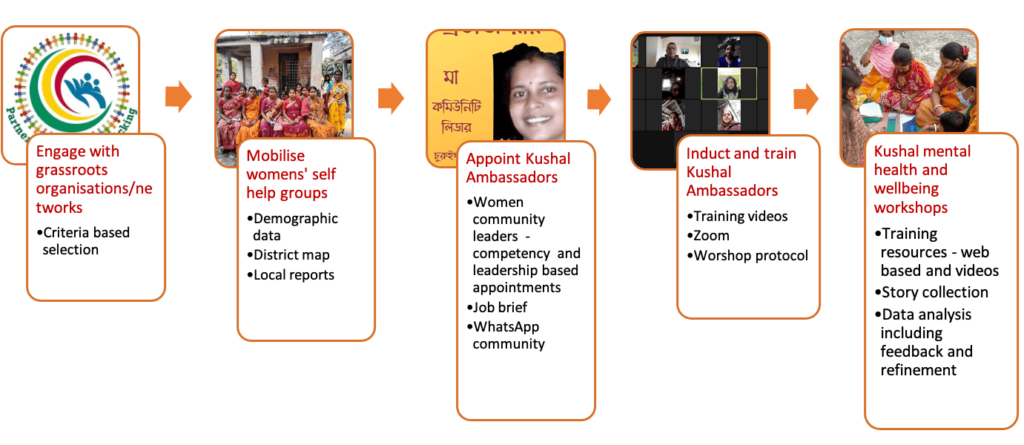Antenatal wellness and mental health workshops
In local communities, Kushal consistently organizes well-being workshops every week. These sessions, known as 'Kushal Saathi' in Bengali, meaning 'your well-being friend,' are orchestrated by a network of adept social entrepreneurs deeply ingrained in the community. These individuals are equipped with training in a methodology meticulously crafted by Kushal.
Pregnant women are directed to these workshops through referrals from ICDS centres, Primary Health Centres, self-help groups, and word of mouth. The workshops are conducted in diverse settings, including primary schools, community centres, and the homes of Kushal Saathi and the expectant mothers involved. These gatherings serve as a nurturing environment where women can candidly share their pregnancy experiences, provide mutual emotional support, and glean insights on maintaining both physical and psychological well-being.
Operating in rural, semi-urban, and urban landscapes, our weekly groups adhere to standardized components, ensuring a consistent and impactful experience for all participants.
Story Telling
At the heart of what we do lies story telling. In our workshops, the power of story is used for therapeutic storytelling and narrative therapy. Also, the communities we work in oral story telling is a long-established tradition that has been used to educate and entertain. We build on this tradition in the workshops to nurture peer support and connections in the group. Story telling helps us keep track of our project and also refine and build content in an ongoing way.
Breaking the digital gender divide
In the communities that we work, we have seen that access to and familiarity with smart phones plays out in various ways. A minority own and independently use their smart phones, some have limited access to smart phones that are owned by male family members, some women share and make use of the same smart phone while others have never used one and totally rely on their husbands to pass on any internet-based information.
Training women in our workshops on how to access the internet and navigate our website to access wellbeing resources is important to us. To help pregnant women, we have developed audio visual resources on the basics, such as, how to download the google app, how to access our website on the internet and navigate Kushal’s web resources and access covid related information on You Tube. Kushal Saathi who facilitate the workshops champion digital use also with the objective that familiarity will encourage wider use of the internet for livelihood support and education. We also use digital story-telling to build a wider motherhood story telling community and facilitate interconnectivity between groups and individuals.
supporting pregnant women during covid
In 2020-2021, we collaborated with three private and government hospitals in Vijaywada, Andhra Pradesh to carryout COVID awareness in relation to pregnancy. Our programme complemented clinical services that are provided in these hospitals. Over 35,000 births take place annually in the three hospitals – Government General Hospital, NORI multispecialty hospital and Vasavya Nursing Home. We developed video clips for pregnant women, frontline workers and other training resources to support community workers and pregnant women.
In lockdown Kushal Saathi continue to keep in touch with their pregnant clients each week. Sessions are conducted one to one by phone and video calls, WhatsApp chats and group video calls are organised. Women who don't have phones are counselled using safe protocols advised by the government.
We are the first initiative of its kind in India that takes a community-based approach to maternal mental health and wellbeing.



